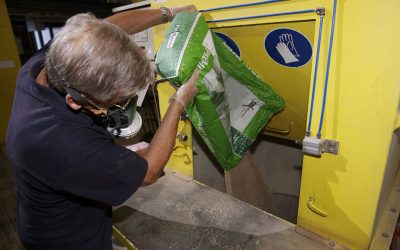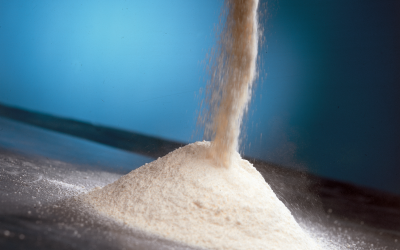11 dairy innovations at SPACE 2022 not to be missed
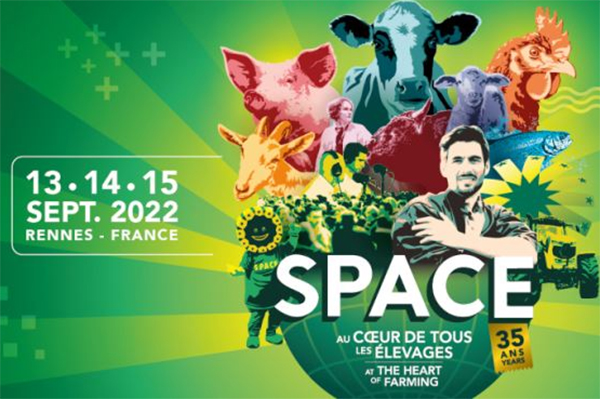
This year, many of those in the dairy sector will once again experience a trip to Rennes, France, where SPACE 2022 will take place in mid-September. Many innovations will be showcased – here are some not to be missed!
1. Tailor-made document for selected anthelmintic approach in dairy cows
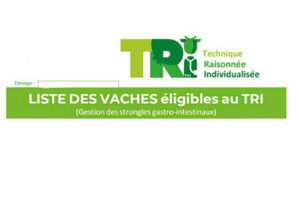
Ceva Sante Animale: Tri Automated Process
In a context of better use of parasiticides, the automated TRI (Individualized Reasoned Technique) sheet makes it possible to generate, from dairy performance data, the list of dairy cows that have priority for deworming at the start of the barn, a classic period of management of parasitism for these animals.
It is intended for the veterinarian-breeder tandem, and serves as a basis for the implementation of selective deworming (rather than systematic).
This service makes it possible to respond to 3 challenges:
• Improve the return on investment by targeting animals at risk (simulation of margin gain for the breeder)
• Slow down the development of resistance of worms to parasiticides
• Reduce the environmental impact by rationalising the exposure of the herd to the molecule (simulation of the evolution of I2E: Indicator of Exposure to Endectocides). (Hall 1, Stand D36)
2. AI-based herd monitoring solution
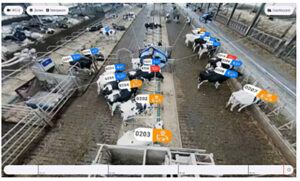
AIHERD : AIHERD
AIHERD is the new-generation herd monitoring solution. No more sensors on the animals – by combining Computer Assisted Vision and Artificial Intelligence, AIHERD monitors the herd for farmers and alerts them on specific events (zootechnical elements and/or pathologies).
A set of cameras enables the identification and monitoring of animals 24/7, while an AI analyses all the information (identity, posture, behaviour, time budget, etc.) in real time to identify the major events in the life of the herd and thus alert the farmer. The farmer receives the information very early on, with the possibility of controlling it via video extracts and thus keeping control of the decision-making process. The farmer is then assured that he will not miss any event in the life of his animals.
This solution improves the well-being of the animals, the working comfort of the farmers and finally the economic performance of the farms. (Hall 11, Stand B43)
3. The new generation of monitoring ear tag
Allflex De Msd Sante Animale : Ear Tag Flex V2
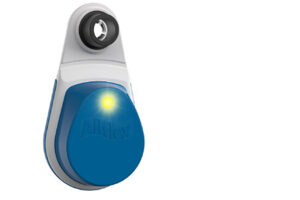
An advanced monitoring ear tag for beef and dairy cattle, the monitoring ear tag Flex V2 collects and monitors critical data to deliver timely reproduction, health and nutrition insights.
Exceptionally lightweight at just 25g, the Flex V2 ear tag preserves cow comfort and delivers long-lasting value and high return on investment.
The new multi-function LED indicator enables anyone to quickly and easily find specific animals needing different types of attention. LED activation can be predefined either per animal or by report (health and/or heat).
With an extended battery life of up to 5 years, the Flex V2 reduces the number of monitoring tags needed across each animal’s lifetime saving time and costs while minimising cow discomfort. Furthermore, tags can be removed from one animal, and attached to another, maximising utilisation across the tag lifetime. (Hall 1, Stand E47)
4. Matrix-encapsulated combination of methionine and lysine
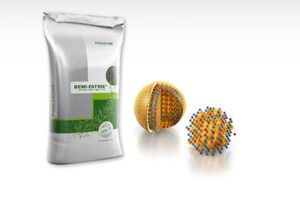
Bewital Agri GMBH & Co. KG : Bewi-Fatrix lM 101
High-yielding dairy cows are often lacking in amino acids methionine and lysine. These are supplied through microbial protein and rumen-undegradable protein from feedstuffs, but not in sufficient amounts to cover the requirement. Increasing the protein carrier use can reduce the lack, but this is inefficient. The BEWI-FATRIX LM 101 is a further developed product to easily add both amino acids in a rumen-protected shape to not only enable the supply of both amino acids but also to ensure an optimal amino acid supply with reduced protein carrier use. This improves the efficiency in milk production. Additional, protein that is not required is not beneficial from a health or economic perspective. Feeding both amino acids in optimal doses in a rumen-protected shape is relevant not to be degraded in the rumen to allow the metabolic use. With this the nitrogen efficiency and the milk yield can be improved, by feeding only one product: BEWI-FATRIX LM 101. (Hall 9, Stand A18)
5. New options on mixer buckets
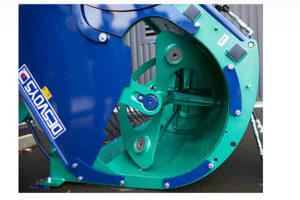
Desvoys : Wear Plate & Magnet
French company, Desvoys, presents 2 new improvement on its feed buckets. The first aims to strengthen the bucket bottom by bolting a Hardox plate, an abrasion resistant steel, and addresses abrasion due to fodder friction. It’s no longer necessary to change the bucket or to call after sales service. The user can order the parts and can simply replace the sheet by taking off the bolts.
The second innovation is based on the flighted screw. It’s an interesting part for cattle security. Two or 4 magnets, according to the model, are mounted on the flighted screw extremity to attract unwanted metallic elements in the feed. In this way, it limits veterinary costs. (Open air, Stand C25)
6. Rapid point of care pregnancy test for cows
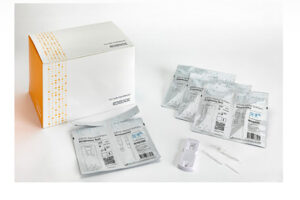
IDEXX : Alertys on farm pregnancy test
Alertys On Farm is the first point of care rapid pregnancy test for cows that can directly be managed by farmers from a simple blood sample. Alertys On Farm is based on the detection of a PAG (Pregnancy Associated Glycoproteins) pool which are pregnancy specific markers within ruminants. The test can be used from 28 days after insemination and during the whole pregnancy. Alertys On Farm allows farmers to confirm their cow’s pregnancy status within 10 to 20 minutes on the farm. The test can be managed on serum or whole blood (using EDTA lavender cap tube). Result reading is visual and doesn’t need specific materials. Different field trials in dairy cows (Idexx study) or suckling cows (South-Dakota University) demonstrated strong reliability of Alertys On Farm in comparison with echography’s with in particular a high sensibility of 99%. Several field trials conducted in France received good farmer’s feedback in term of ease of use and reliability. (Hall 1, Stand G88)
7. Biodegradable hoof tape for farm ruminants
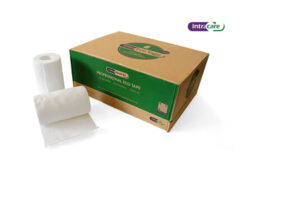
Intracare: Intra Eco Tape
Worldwide, 15 million synthetic hoof tapes are used annually on lame cows by hoof trimmers, professional livestock farmers and veterinarians. These 15 million plastic tapes, usually 4.5 metres each and 10 cm wide (approximately 7 km2 microplastics), end up in the environment in the waste container, the manure pit or on the field.
Intracare has spent 2.5 years researching a biodegradable hoof tape (Intra Eco Tape) made from natural fabric. This brand new biodegradable tape has kept its positive properties such as good stretchability, easy to tear and adheres perfectly. In addition, this innovative biodegradable tape offers benefits over the synthetic one, as a bandage and compress in one. In addition, the oxygen permeability of the new tape can support skin recovery. The fact that the new tape does not cut into the skin, cannot be tied too tightly and usually falls off within 2 days are strong animal welfare values. The major advantage of Intra Eco Tape is its environmental friendliness thanks to the strong reduction of microplastics. (Hall 1, Stand E52)
8. Radio controlled door for cattle truck
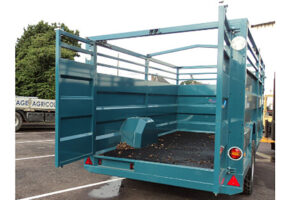
Lenormand Constructeur : Bétadist
When transporting live animals, the opening and closing of livestock doors are particularly accident-prone (risk of jostling or being trapped by a door). The use of a radio-controlled opening allows the user a great deal of freedom of movement and to stay away from the livestock during these delicate operations. The doors are operated by synchronised hydraulic cylinder powered by a hydraulic unit driven by a 12 volts motor connected to the tractor’s battery to allow work to be carried out with the tractor’s engine stopped. A hydraulic safety system limits the closing force of the doors to protect the animals and the user. The device is also equipped with an anti-return device to prevent the doors from accidentally opening again when pushed by animals. A safety device keeps the doors closed particularly for the road transport. (Open air, Stand C26)
9. Solution to reduce the methane production through the feed
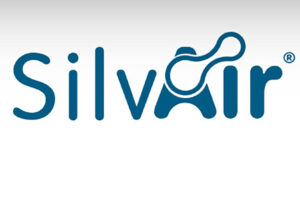
Provimi Cargill : Silvair
Silvair reduces the production of enteric methane by 10% at the recommended dose for use in farm, while maintaining dairy performance.
This nutritional solution contains patented technology based on more than 10 years of research and 26 scientific publications in peer-reviewed journals, with some trials carried out in France. It thus reduces the production of methane, resulting in a reduction of approximately 1 kg of CO2 equivalent per cow per day. In addition to this environmental benefit, it is a source of dietary protein and soluble calcium, which gives it a strong technical and economic interest. Silvair is already authorised in animal feed under EU regulations. It can be used in synergy with other levers. It is also recognised by various European interprofessions for its effect on the reduction of methane. Provimi provides several matrices to evaluate different ‘sustainable’ formulations. (Hall 8, Stand B25)
10. Semi-barrier silage sheet made of recycled plastic
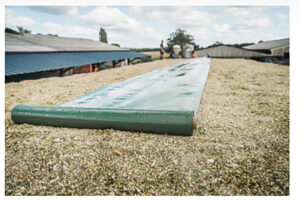
Trioworld : Trio2
The TriO2 sheet is a silage sheet made of at least 40% post-consumer recycled plastic (PCR) with high technical properties and without non-recyclable additives. Its role is to maintain the absence of oxygen in the silo to preserve the harvested forage and limit losses.
Its use, coupled with adapted harvesting and storage practices, ensures optimal conservation of the silage. Indeed, its thickness of 115 microns and its high resistance (dart>1,000g) allow an easy installation on the silo. Moreover, thanks to an adapted composition, its oxygen barrier properties have been improved compared to other standard sheets (oxygen transmission <180 cm3/m2/24h) which leads to a maximum limitation of conservation losses.
The innovation around this product lies in the achievement of these high-quality properties by incorporating a minimum of 40% PCR in the recipe. This is made possible by an expertise in extrusion but also in recycling acquired since 1985 in our Ombrée d’Anjou plant. (Hall 9, Stand D88)
11. Chemical-free, easy and reliable disinfection of calf hutches
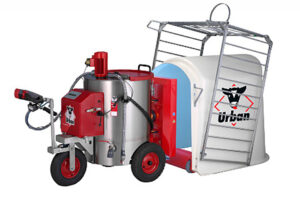
Urban Gmbh & Co.Kg : Ecoprotector Uv-C
The EcoProtector UV-C is a rear-mount attachment for the Urban MilkShuttle, designed to disinfect the calf housing environment using UV-C radiation. The main element is a UV-C irradiation unit, equipped with four powerful UV-C tubes, which are powered by the on-board electrical system of the MilkShuttle.
When mounted horizontally, the unit can effectively disinfect floor surfaces by passing over them. An independent institute confirmed that even a single pass reduced the microbiological contamination by 99%. The use of the EcoProtector UV-C is not limited to the disinfection of floor surfaces. When mounted vertically, the device can also be used to sanitise the inside of calf hutches. The EcoProtector UV-C is placed at the opening and the application of UV-C radiation effectively disinfects the interior of the hutch. (Hall 11, Stand B37)




